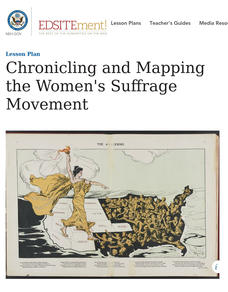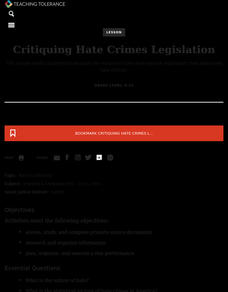DocsTeach
Analyzing the Cotton Gin Patent
Decode primary sources in a fast-paced activity. A quick guessing game helps pupils use visual clues to understand primary sources. Academics look at a picture of the cotton gin and must guess what it is without other knowledge or clues....
Teaching Tolerance
Dismantling Racial Caste
It's time to end racism. The final installment of the series encourages scholars to consider what is needed to ended the racial caste system in the U.S. Young historians complete group discussion, written prompt, and a hands-on-activity...
Teaching Tolerance
Parallels Between Mass Incarceration and Jim Crow
Is history repeating itself? A riveting lesson examines the parallels between mass incarceration in the U.S. and the Jim Crow Laws of the past. Academics review Jim Crow Laws and compare them to mass incarcerations of African Americans....
Teaching Tolerance
Understanding the Prison Label
Break the chain. An engaging lesson examines why it is so hard to break free of the prison system in the US. Academics participate in a reader's theater, read primary sources, and discuss their thoughts. The lesson explains the hardships...
Teaching Tolerance
Racial Disparity in the Criminal Justice System
Explore the impact of the war on drugs in a thought-provoking lesson for high school academics. Young historians delve into the world of the criminal justice system and the racial disparity that occurs in the US. The resource provides...
Teaching Tolerance
The War on Drugs—Mechanisms and Effects
The war on drugs doesn't have definite results. An interesting lesson examines the social, political, and economic effect of the war on drugs. Academics learn how the war on drugs has led to mass incarcerations and negatively affected...
Teaching Tolerance
Mass Incarceration as a Form of Racialized Social Control
Mass incarceration: A result of a tough stance on crime or racial discrimination, you decide. Academics explore the history and reasons behind mass incarcerations in the United States and its impact on ethnic communities. The...
Teaching Tolerance
Jim Crow as a Form of Racialized Social Control
Just because slavery was illegal doesn't mean it went away ... Jim Crow Laws took its place. An eye-opening lesson focuses on how Jim Crow Laws were used as a form of racial social control against African Americans in the United States....
Teaching Tolerance
Introducing 'The New Jim Crow'
When Jim Crow Laws ended, the intent behind them did not. Academics read "The New Jim Crow Laws" and an interview from the author to understand how racism has not ended, but rather changed over time. The lesson explains how prejudices in...
National Endowment for the Humanities
The Matter of the Philippines
The United States won the Spanish-American War, so now what? Young scholars act as advisors to President McKinley and use primary sources to recommend what America should do with its territories. Using a variety of perspectives—including...
National Endowment for the Humanities
The Spanish–American War
The Spanish-American War propelled the United States to the world stage and helped create the modern super power. Using web-based primary sources and a WebQuest format, young scholars consider the causes and outcomes for the war. Working...
National Endowment for the Humanities
The Question of an American Empire
As it rose to being the new super power, America had a choice: conquer other nations like its European predecessors, or stay home. Using primary source documents from those thinking about American foreign policy in the late 1800s,...
National Endowment for the Humanities
Frederick Douglass’s Narrative: Myth of the Happy Slave
The firsthand accounts of what it was like to be an enslaved person in the mid-1800s riveted a nation and the issue ultimately led to civil war. Using excerpts from Frederick Douglass's autobiography, budding historians examine what it...
National Endowment for the Humanities
The Power of the Majority over Thought
While Alexis de Tocqueville mourned a lack of "freedom of discussion" in America in the early republic, today's pupils are concerned about peer pressure. Using excerpts of de Tocqueville's writing and discussion questions, scholars...
National Endowment for the Humanities
The Tyranny of the Majority
In American democracy, majority rules but what prevents the voices of the few from being crushed? Using excerpts from Alexis de Tocqueville's writings, young historians explore cases where minority rights were trampled upon. Extension...
National Endowment for the Humanities
The Omnipotence of the Majority
While the American system is based on the idea of almost-universal suffrage for adults, great thinkers have had concerns about this system of governance. Using classic writings from Alexis de Tocqueville and videos highlighting thinkers...
National Endowment for the Humanities
Chronicling and Mapping the Women's Suffrage Movement
While women's suffrage is often believed to be the result of a single constitutional amendment, the effort of women to secure the vote spanned decades and continents. Using primary sources in online archives, class members explore the...
National Endowment for the Humanities
Oyez! Oyez! Oyez!: Simulating the Supreme Court
Students have freedom of speech—or do they? Using an actual court case and research materials on the Supreme Court, young legal scholars examine the Supreme Court's role and history. Then, they argue a case the court declined to hear and...
Teaching Tolerance
Slavery as a Form of Racialized Social Control
An engaging lesson delves into the effects of slavery on society. Young historians read text excerpts, complete handouts, and participate in group discussion to understand how slavery was a means to control society and establish a racial...
Teaching Tolerance
Critiquing Hate Crimes Legislation
The high school lesson plan explores what hate crimes are and how the government has responded to those crimes. Academics read legislation, analyze political cartoons, and complete hands-on-activities to understand what motivates...
National Endowment for the Humanities
Doing Oral History with Vietnam War Veterans
Get the story from those who experienced it. Engage learners with a structured oral history project involving Vietnam War era veterans. By conducting thoughtful interviews, class members learn what it was like to serve in the...
National Endowment for the Humanities
“From Time to Time”: Presidents and Communicating with the Public
While the Constitution requires a "State of the Union" address, it doesn't give many details. In fact, it wasn't until Woodrow Wilson that the periodic update to Congress was given in-person. Using primary sources, recordings and...
Facing History and Ourselves
Literature and Imagination Make Democracy Work
The final lesson plan in the "What Makes Democracy Work?" series examines the connections between imagination, literature, and democracy. Class members listen to a podcast, read an excerpt from Azar Nafisi's, The Republic of Imagination,...
Facing History and Ourselves
Reflection and Action for Civic Participation
Slacktivist or activist? Bystander or upstander? Positive social change requires involvement and commitment. After reading a series of articles about young people who chose to get involved, scholars examine a framework that helps peers...

























